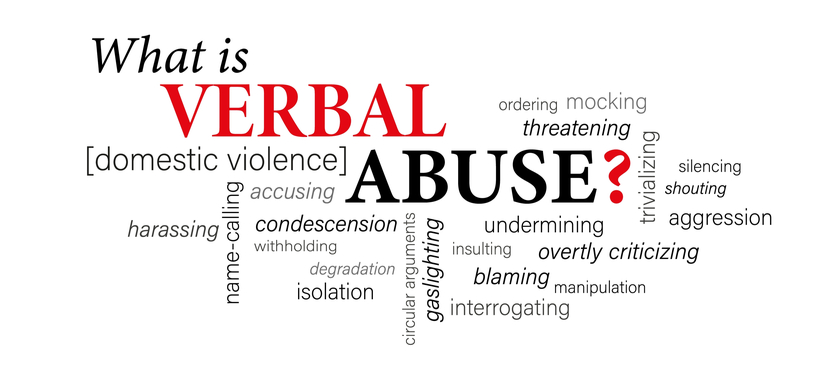Your spouse constantly yells at you and calls you names. They criticize and humiliate you. They are controlling and can even be manipulative.
These are all signs of verbal abuse. You may think this type of communication is common in relationships, but it should not be. Verbal abuse tends to occur gradually and over time, it can actually be as harmful as physical abuse.
It can be a frustrating situation because at the same time, your spouse may seem very loving. However, the way they talk to you can damage your self-esteem.
Verbal abuse does not leave any physical marks, so you may think verbal abuse is not too bad—at least your spouse is not hitting you. But one day, the verbal abuse may turn into physical abuse, and you could end up injured or even killed. It has happened to many people.
Stop dealing with your spouse’s verbal abuse. Here are some tips for identifying it as well as some things you can do to remedy the situation.
Examples of Verbal Abuse
Verbal abuse is a violence type of speech that may include criticizing or insulting another person. Some examples include:
- Name calling. Name calling can be blatant or passive aggressive in nature. Sometimes names and insults are disguised as pet names. For example, “you’re too dumb to understand, sweetheart.” Or “No wonder my family thinks you’re a jerk.”
- Humiliation. Your spouse may embarrass you, then accuse you of being overly sensitive. They may also claim that it was a joke and that you have no sense of humor.
- Frequent yelling or screaming. Effective arguing means being calm. If your spouse always has to raise their voice and scream at you, then it is verbal abuse.
- Constant blame. Your spouse may always start arguments, but blame you for starting them. They then try to make you feel guilty and act like they are the victim.
- They hit the wall, pound their fists, or throw things. When verbal abuse escalates into physical forms of anger, things can get scary.
- They get into your personal space. If your spouse tries to block you or prevent you from moving away, they are going beyond verbal abuse and acting in a controlling manner.
- Manipulation. This is common toward the end of a marriage after you have threatened divorce. Your spouse may use persistent and threatening words to make you feel uncomfortable. If your spouse doesn’t want a divorce, they will say whatever they think they want you to hear to manipulate you. They want to keep you in the marriage, so they will try to make you comply with their desires.
- They want credit for not having hit you. If your spouse brags that they did not hit you, get out of the marriage quickly because one day, they may very well physically abuse you.
Are You a Victim?
Are you a victim of verbal abuse? Here are some signs:
- You have low self-esteem. You blame yourself for everything bad that happens in the marriage. You try so hard to keep the peace that you drive yourself crazy.
- You feel different. You do not feel like the same person you used to be. You may not stand up for yourself anymore because you fear upsetting your spouse.
- You are walking on eggshells. If the verbal abuse is severe, you feel like your safety is at risk. If you are afraid to say anything at all to your partner, it is time to re-evaluate your relationship. That is not a way to live in a marriage and the next step could very well be physical abuse.
How to Handle Verbal Abuse
If you are a victim of verbal abuse, you need to figure out how to handle it. Here are some tips to follow:
- Seek counseling. It is best to go together as a couple, but go alone if you have to.
- Get support from friends and loved ones. You should be able to discuss your situation with a good support network.
- Communicate with your spouse. Let them know how hurtful their words are and be prepared to set boundaries to let them know you will not continue being a victim of the abuse any longer.
- Do not engage in conflict. If your spouse becomes angry, stay calm and walk away. Do not yell back or give any sort of reaction.
- Do not ignore your feelings. As the saying goes, trust your gut. If something does not feel right, then do something about it. Do not stay in your marriage if you feel uncomfortable.
- Leave the marriage if your spouse is not making an effort. If the verbal abuse continues after communicating your feelings, do not feel as though you should stay. Take the proper steps to leave the home and hire a divorce lawyer. Ideally, you should find a lawyer who specializes in domestic violence, as some people turn to physical abuse once their spouse leaves them.
- Do not blame yourself. Your spouse’s behavior and actions are not your fault. Do not feel as though you should be to blame.
Seek Legal Help
Unlike physical abuse, verbal abuse can be tough to recognize. You may not know you are a victim until you reach a certain point. By then, it may be too late to repair your broken marriage.
If verbal abuse has taken its toll on your marriage, you need help. Broward County divorce attorney Scott J. Stadler can guide you through the divorce process. To schedule a consultation, fill out the online form or call (954) 398-5712.

